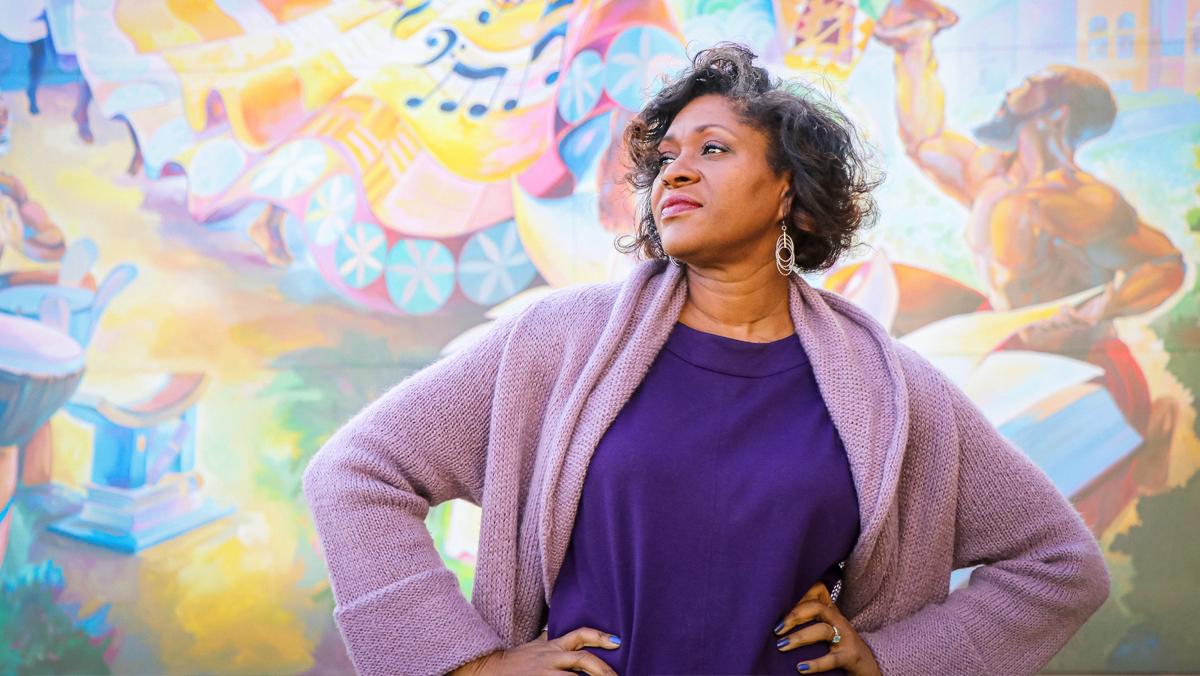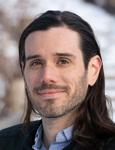Dasha Kelly Hamilton is on a mission. She is leading a poetry workshop in Port Louis, the capital city of Mauritius, a tropical island about 1,200 miles off the southeastern coast of Africa. Sunlight pours into a narrow room as a group of young people listen to Dasha tell a story about how, as a child, she wanted to change her name. She tugs at her dress as if she were nine years old again. It’s an endearing gesture. Dasha has a magnetic presence, graceful yet piercing. The students lean in closer.
She’s been here about a month, sent to Mauritius as an Arts Envoy by the U.S. Embassy. The purpose of today’s workshop is to reflect on the meaning of names. She asks each student to consider their own legacy. “What will people think in the future,” she asks, pointing to each soul in the sun-drenched room, “when they hear your name?”
One day an embassy staffer offers to send Dasha to a culinary school on the island. The staffer had read in Dasha’s biography that she is a “connoisseur of carrot cake,” so the offer seemed appropriate. Not one to miss an opportunity, Dasha agrees and soon finds herself in the school library researching the history of carrot cake, and then cake in general. It is at that moment that Dasha is visited by an idea for a performance—part presentation, part demonstration, part discussion—that explores the complicated legacy of race and class in America through the seemingly simple process of making a cake.
After she returns to the United States from Mauritius, Dasha refines the idea during a residency at the John Michael Kohler Arts Center in Sheboygan. Her performance, Makin’ Cake with Dasha Kelly, debuts on November 16, 2017, at the Kohler Theatre. On stage, two chefs measure and mix ingredients alongside Dasha, who presents a palette of cake-related stories and images that illustrate the foundations of exclusion and inequity in America.
“What [cakes] have in common is the story of access, the story of elitism and class, which ties into the story of race,” says Dasha. “The performance is not here to sweeten or soften the edges of the conversation, but to pull people in through a portal they don’t expect.” At the end of each performance, there is a reception featuring baked goods from local producers. Audience members and performers mix and mingle over paper plates heavy with thick slices of cake.
Subsequent successful productions of Makin’ Cake at a few other venues ensued until the global pandemic ground the show’s momentum to a halt. Fortunately, the show has been picked up by a national talent agency and is being booked in venues across America for 2022 and beyond. Dasha concedes that it is probably best that Makin’ Cake is on hold. To say her plate is full right now would be an understatement.
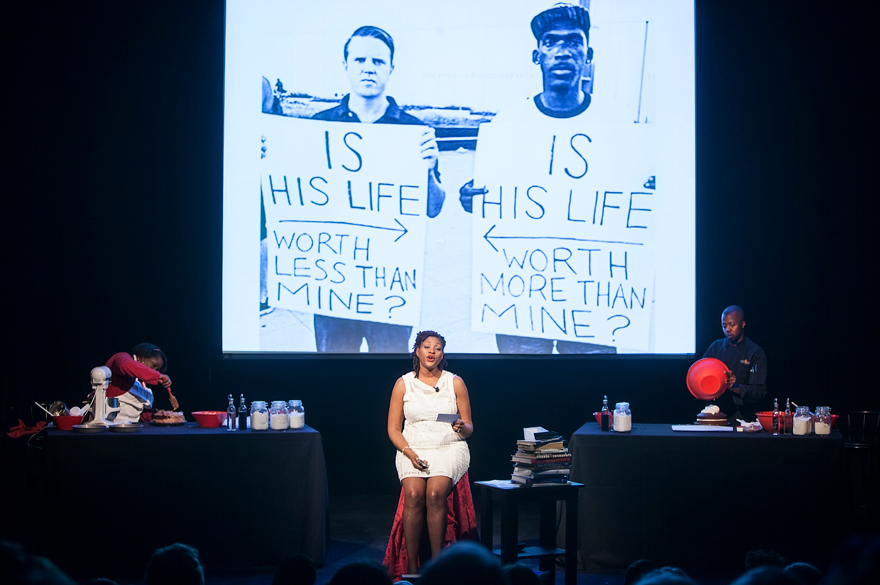
In 2021, Dasha will not only serve as Wisconsin Poet Laureate, the statewide emissary for poetry and creativity, but also finish the second year of her two-year appointment as Milwaukee Poet Laureate. In addition, Dasha is one of ten recipients of a Rubinger Fellowship. This national recognition is awarded by the Local Initiatives Support Corporation to “change agents” working on innovative solutions to community development. As a Rubinger Fellow, Dasha is developing a scalable, replicable “Neighborhood Creatives-In-Residence” program that can be used by cities to expand creative networks and deepen community engagement and issue advocacy.
Dasha’s extraordinary talents have taken her all over the world, from Botswana to Beirut, Los Angeles to Nebraska, even on camera for the final season of HBO’s Def Poetry Jam. Dasha possesses a remarkable ability to leverage people power and the creative process to uplift both our spirits and our society. To do this, she draws on a career that spans multiple services and sectors and has culminated with her new title as Wisconsin Poet Laureate. Of course, it isn’t the first—nor will it be the last—title Dasha will earn.
All the travel and juggling of projects comes naturally to Dasha. She grew up a self-described “Army brat,” expanding her worldview in classrooms around the globe. “Childhood for me is this family unit of four being in a new place,” she recalls, “like those plastic toys you can plop onto different scenery.” The Jones family tour began in Milwaukee, where Dasha’s parents, Rodrick and Daphne, were born and raised. They met at the University of Wisconsin–Whitewater. When Dasha was four, Rodrick was commissioned by the U.S. Army. The family bounced from base to base: Georgia, South Korea, Indiana, Germany, Hawaii, Illinois.
As a child, Dasha spent much of her time playing games with her sister, Tamu, and writing. It wasn’t until college, when she was working as a tutor, that she came to appreciate writing as a gift. “Explaining to someone that what they thought and what they wrote weren’t even close, it was baffling. It was my first writerly experience of explaining to someone how to try to get those things to align,” she recalls.
Yet, in her early years, writing as a profession wasn’t even on her radar. Inspired by the 1976 television movie Sybil, Dasha planned on becoming a psychologist when she grew up. Though she abandoned the pursuit in college, Dasha maintains her fascination with the inner lives of people and has learned to explore them in various ways.
In her early twenties, Dasha found herself in Chicago with a Master’s degree in marketing communications and a job at a boutique nightclub. She booked talent and organized events, which gave her the experience and confidence she would need when she opened her own entertainment venue a decade later. In the interim, she moved to Milwaukee and became the director of the Black Achievers program at the Northside YMCA. Through running this college-readiness program, Dasha acquired not only the skills she would need to operate her own nonprofit organization but also an appreciation for the perspectives of young people.
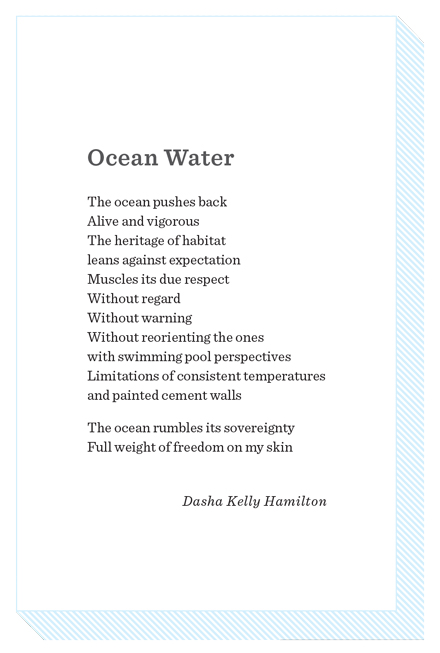
One night after work at the Northside Y, she and a group of friends went to a corner bar in Milwaukee called The Main Event. The place had a small stage, and, on it, she saw a young woman reading poems. She’d seen poetry performed on a stage in Chicago, but it didn’t grab her the way it did that night at The Main Event. “It was intimate, there were probably fifty people that night,” she says, recalling the energy of the room. “It was electric, watching people just read their stories. Having been introduced to poetry the way that I had, the way many people have been, I wasn’t able to see it as a living thing. But this was someone saying words they wrote—words that mattered to them.”
In 2000, Dasha opened Mecca Nightclub on Milwaukee’s north side. Inspired by what she saw and felt at The Main Event, Dasha added the Still Waters Open Mic Poetry Night to Mecca’s calendar of events. Over time, the attracted poets from around the country. The series evolved organically into Still Waters Collective, a collaborative effort to provide resources to Milwaukee-area writers and cultivate raw creative talent. Busy with the YMCA and Still Waters during the day, and running Mecca at night, Dasha still found time to self-publish her debut novel, All Fall Down, a story about how mental illness can alter a friendship.
When a friend who taught at a local school asked Dasha to help bring more poetry into her third-grade classroom, Dasha began to consider the impact spoken word might have on young children. Upon meeting her group of third-grade students, though, Dasha quickly realized her approach as a teaching artist would be nontraditional. “This was not about teaching poetry. It was not about teaching writing,” she recalls. “It was entirely about giving these young people access to how great they already are.”
Dasha’s teaching experience led her to shift the mission of Still Waters to focus on cultivating the three Cs—community, capacity, and confidence—in young people. During the late 2000s and early 2010s, Dasha and her Still Waters team began working with Milwaukee-area schools to deliver a constellation of workshops, after-school projects, and events tailored for young people with an interest in cultivating their own voice, ideas, individuality, and agency. Some of the most popular Still Waters-hosted events were poetry-based: the Milwaukee High School Slam League and Voltage, a monthly spoken-word series. These events gave teens a chance to earn a spot on Wisconsin’s team for Brave New Voices, an international youth poetry slam festival where the poetry readings are also dramatic performances.
Many of the students maintained their connection to Still Waters after graduating. So when Dasha wanted to grow the nonprofit, she tapped into the network of alumni and asked them to mentor younger teens. “I needed people who could create space and be expansive,” says Dasha, recalling how she recruited young adults to become coaches for the various high school poetry slam teams.
The alumni-to-coach program evolved into a fellowship that helps recent graduates with life skills and “reentry into these grownup streets,” as Dasha puts it. “Here’s how you translate those really passionate feelings and opinions you had at seventeen, when maybe you didn’t believe you knew what you were talking about. But now at nineteen, twenty, how are you going to be in the world?”
In many ways, Dasha’s work through Still Waters, and now as Wisconsin Poet Laureate, is about getting more creatives out in the world and in places where you might not typically find them. “It’s [more than] just being called on when you need a dancer for your thing or a poet for your grand opening; it’s about having artists embedded in the planning of projects, in programs, in residencies—valued for more than simply the stuff that we create.”
In conversation, Dasha is animated, ardent about finding just the right word to communicate precisely what she means. When descriptions won’t suffice, she deploys clever metaphors. While discussing a recent project that involved weekly phone calls to “under-connected” elders to fight off pandemic isolation, Dasha attempts to describe how comfortable the seniors were with talking about themselves and being creative. “No, ‘open’ isn’t honest. ‘Open’ isn’t what they were at all. It’s like ice cubes in a tray that are almost done, but you can see that they’re not all the way frozen, you can still see the bubbles.”
Dasha’s poems retain this conversational feeling and draw heavily on imagery. They span from the intimate, sometimes confessional, to the grand sweep of cultural observation and, occasionally, pointed criticism.
“I often describe my poems as capturing feelings between glass, like a scientist. Here is this little sliver and this is what I see,” says Dasha. In her 2018 poem “Family Night,” she explores human interconnectedness and the ways in which identity sometimes gets in the way of it:
We lay down our best attempts at
Aligning ourselves, random and divined
Our tiles slide one over the other
Puzzling our perspectives
Into crossword intersections of a truthYour pain
His persecution
My pride
Her privilege
Poet. Teacher. Mentor. Maker. It has taken Dasha decades to find a fitting title for her role. “Saying that I’m a writer didn’t hold the fact that I’m also a facilitator, which didn’t hold the fact that I’m also a performer, which didn’t hold the fact that I also do strategy, and on and on,” she says.
A few years back, Dasha heard the term “change agent” used to introduce a speaker at an event. It resonated with her. “It’s the alchemy of saying a thing, or building a network, or inserting yourself in a conversation that’s going to alter something; someone’s opinion, someone’s will, the temperature of a room.” While she might not always have the solution, Dasha notes that she has “unique tools and talents that inspire solution-focused ideas.”
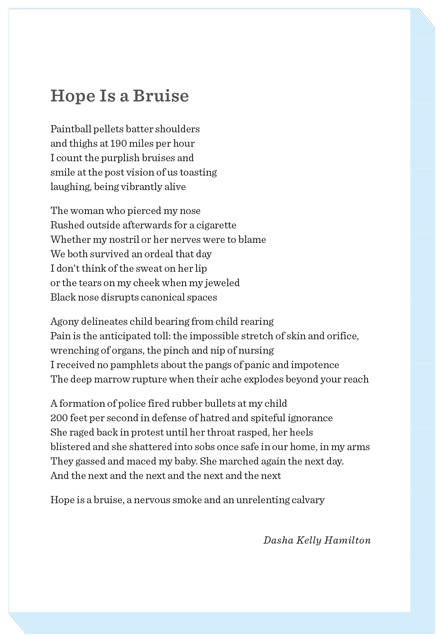 As she learned more about what being a “change agent” entailed, she discovered how it was associated with those engaged in the Civil Rights Movement, including the poet Gwendolyn Brooks. When Dasha contributed an essay in the 2017 collection The Whiskey of Our Discontent: Gwendolyn Brooks as Conscience and Change Agent, she felt strongly about adding “creative” to the term “change agent,” and later adopted it as her own.
As she learned more about what being a “change agent” entailed, she discovered how it was associated with those engaged in the Civil Rights Movement, including the poet Gwendolyn Brooks. When Dasha contributed an essay in the 2017 collection The Whiskey of Our Discontent: Gwendolyn Brooks as Conscience and Change Agent, she felt strongly about adding “creative” to the term “change agent,” and later adopted it as her own.
“Being creative means you’re alive,” she says, noting that it can be good to allow “some space between creativity and artistry to create a more expanded appreciation for the impact of creativity as a gift, as a tool, as a strategy, and as a resource.”
Dasha says that creativity is just what is needed for Americans to better understand the impact institutionalized racism and implicit bias have on people of color. Here in Wisconsin, for instance, the criminal justice system has been particularly pernicious. In Milwaukee, neighborhoods in the 53206 zip code—which are predominantly African-American—have the highest rate of incarceration in the entire nation. One out of every nine African-American adults in Wisconsin is disenfranchised due to their criminal record, compared to one out of every fifty Wisconsin voters overall. The statistics are grim, but our solutions don’t have to be.
As the state’s poet laureate, Dasha plans to employ poetry to expand a dialogue about incarceration, community, and returning citizens through A Line Meant, a playfully worded project with a serious goal. The project will revolve around an anonymous poetry exchange between Wisconsin residents and poets incarcerated in Wisconsin prisons. In addition to developing and managing the necessary infrastructure to make the project happen, Dasha will create new, blended poems inspired by the exchange.
“A Line Meant will be a subversive way to have a conversation about the role of prisons; a reminder that these are sons and fathers and sisters and moms and teenagers. Some of them are absolutely wrong, but all of them are people,” says Dasha.
The poetry exchange is being designed with the restrictive parameters of the pandemic in mind. Like most of us, Dasha mourns the loss of safe, social gathering. She longs for the feeling of a room on fire with ideas, emotion, and fellowship. She is also grateful for what the pandemic has given us: space and time to reflect, reassess, and reimagine. Yet these are not new aspects of her practice. They have been essential ingredients to Dasha’s growth and success, as important as love is to the making of a cake.

